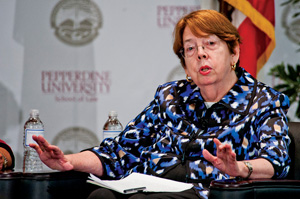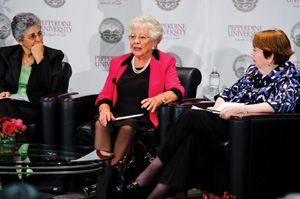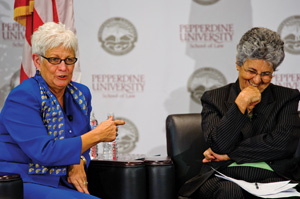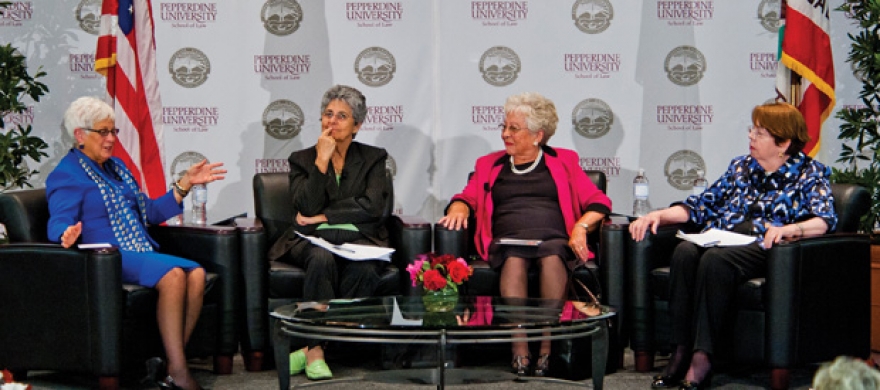“I spent 25 years on the United States Court of Appeals, and in the process I met women whose journeys have been very similar to my own, and they are journeys and stories that have very little been told. We were soldiering through all those years and unlike some other groups, our stories haven’t hit the light of day. What happened to us in the early days of our careers and where we are now in our careers is the story I’ve asked three of my closest friends on the judiciary to tell. You have made me feel very welcome, welcome enough that it’s time to hear these stories.”
With those remarks School of Law dean Deanell Reece Tacha opened “Hearing Her Story: Reflections of Women Judges” to an eager audience in the law school’s Caruso Auditorium. Tacha, former circuit judge, U.S. Court of Appeals for the 10th Circuit, shared the stage with her distinguished panel of guests: the Honorable Carolyn Dineen King, circuit judge, U.S. Court of Appeals for the Fifth Circuit; the Honorable Dorothy W. Nelson, circuit judge, U.S. Court of Appeals for the Ninth Circuit; and the Honorable Rosemary Barkett, circuit judge, U.S. Court of Appeals for the 11th Circuit. The September 23 event officially welcomed Dean Tacha, who took office June 1, and served as a stop along her national tour (read about it on the School of Law website).
Before the discussion began, Dean Tacha sat down with her fellow judges for an exclusive interview with Pepperdine Magazine, conducted by Shelley Saxer, professor of law and director of Pepperdine’s Byrne Judicial Clerkship Institute.
Saxer:Judge King, what do you think has been the biggest impact for you in your professional career, going through several years?

The Honorable Carolyn Dineen King
The Honorable Carolyn Dineen King: I’ve seen myself as a beneficiary of the Civil Rights Act. I began practicing law in 1962 and the Civil Rights Act was passed in 1964. I don’t believe that I would be here today—and I would certainly not have the accomplishments that I have had—if it hadn’t been for the Civil Rights Act.
The first job interview I had was with the United States attorney in Houston. I came with a letter from the assistant attorney general who I had worked for the preceding summers saying, “This woman is fine; you should hire her.” He took me to a stand-up coffee spot instead of his office, and when we got back to the reception area he put his Stetson up on the hat tree and said, “Don’t get me wrong ma’am. I’ve hired me a Black and I‘ve hired me a Mexican, but I ain’t up to hiring me a woman yet.” By the way if you are wondering if he used racial epithets, the answer is he did.
The amazing thing about the man is that he was a bleeding heart liberal. He had hired the first black assistant United States attorney and the first Mexican one in the country, but such was the prospect of hiring a woman in 1962 as a lawyer that he wouldn’t even think of it. The second interview I had was at Fulbright and Jaworski with Leon Jaworski, who offered me a job doing collection work at half the rate of the men.
Now this was all in 1962; these interviews were only separated by a week. That’s an example of the kinds of things that the Civil Rights Act was meant to address. In 1979, the chair of the merit-screening panel for President Carter came to me and said, “Would you have any interest in being a federal judge?” And I said, “No why would I want to do that?” I was a transactions lawyer. We never got near a courthouse and if we did, it was a sign of trouble. He said, “Because President Carter wants to appoint a woman from the Fifth Circuit and we have searched high and low and you are the only one that we can find that’s qualified.” Of course I had never been in a courtroom, so how I could have been qualified? That’s the legacy of all those years.
So all of a sudden in the course of the period from 1964 to 1979, we went from no opportunities for women to it suddenly being an asset instead of a liability and to enormous doors being suddenly opened to women. That’s the history, and my career has very neatly fit within that time frame. I went on and became the chief judge of my circuit, a member of the Judicial Conference, and chair of the Executive Committee. That is what the Civil Rights Act did for me. That’s what my fellow citizens in this country did for me.
Saxer:Judge Nelson, you bring a unique experience here having been a woman dean and then a woman judge on the Ninth Circuit. How have you managed your professional and your personal life in both of those capacities?

The Honorable Dorothy W. Nelson (center) tells her story at the Dean Tacha welcome event
The Honorable Dorothy W. Nelson: I was the first woman on the faculty at USC and I felt totally accepted, but it was the wives who had a problem with me: why was I there? Women wouldn’t approve of this today, but I had each of them to dinner to see my husband, my children, and we became good friends.
When I became a woman dean, an older faculty woman said to me, “Dorothy, come 15 minutes late to faculty meetings. Show them who’s boss.” Instead I went home and baked five dozen chocolate chip cookies, announced there would be food at the meetings—and they came on time. I was working through trying to be myself and not trying to be what they were. They did certain things to get ahead in life, but I had my own style.
I found that as dean I was very interested in dispute resolution and mediation; we counseled in 182 countries and, in China or India, for example, they would clap very nicely and say, “Do come back.” But when I became a federal judge, it was, “Thank you, Judge. How do we do it? How do we start?” That was a huge change for me and although I found becoming a judge isolating in the beginning, I felt far more powerful than as a dean.
Through it all, the most important thing was having the right husband. I remember when I was in China in 1989 and doing work with the Supreme People’s Court and I said to our translator, “I want to meet with women lawyers.” He responded, “Why do you want to meet with women? You’re number one visit, they’re number three visit.” I said, “I’m a woman, Mr. Sun.” “Is the judge coming?” My husband was a Superior Court Judge. “Yes.”
We went and I talked about men and women being two wings of a bird—that one is male and the other is female—and unless they are both strong, the bird cannot fly. Mr. Sun translated very slowly and my husband said, “May I say something? Until women achieve full equality, men can’t be the best of what they can be.” Mr. Sun translated that very slowly, ran down the hall, and brought him back a big present. Then as we left the Chinese women patted my husband uncharacteristically. I said, “What are they saying, Mr. Sun?” “Model husband, model husband.”
Saxer:Judge Barkett, let me ask you about your experience in law school and how you found that experience to be as a woman.

Dean Tacha shares a humorous anecdote with the Honorable Rosemary Barkett.
The Honorable Rosemary Barkett: The law school at the University of Florida was, of course, primarily male. This was 1968 and they made it very clear that they were going to embarrass the women students there. They had a custom called shuffling, where if a woman entered the library, the men, the boys, would shuffle their feet on the wooden floor and you could hear this thunderous kind of noise as you entered. The same thing happened in class. If a woman was called upon or a woman volunteered an answer, she would be shuffled in class. I certainly was aware of it, but I’m not sure if it had the desired effect on me.
I went to law school a little bit later in life. When I graduated from high school I entered a religious order because I thought I had a calling to do that and I was there for about eight years. After I left I taught school for a year and then decided to go to law school, so I was about 27 or 28 years old. I think when you are in a religious order everyone is extremely deferential and people treat you with respect, at least they did in those days. You develop this sort of attitude that expects people to be kind and nice to you, and once you generate that attitude, it sometimes happens—not all the time, but that was my experience in law school.
Now they no longer shuffle and it is such an ancient custom that when I went back to the University of Florida to talk to the law review and made mention of shuffling, I got blank looks from everyone. When I explained it they were properly horrified about the practice.
Watch video of the full event and hear more from Dean Tacha »
